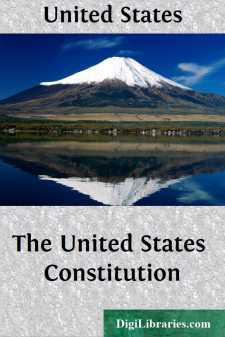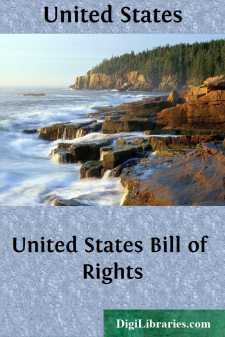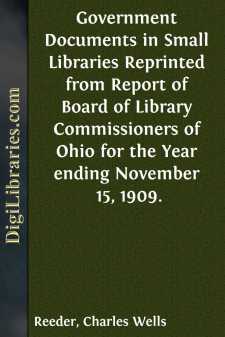Political Science
Political Science Books
Sort by:
by:
Sylvester Mowry
"The NEW TERRITORY of ARIZONA, better known as the GADSDEN PURCHASE, lies between the thirty-first and thirty-third parallels of latitude, and is bounded on the north by the Gila River, which separates it from the territory of New Mexico; on the east by the Rio Bravo del Norte, (Rio Grande), which separates it from Texas; on the south by Chihuahua and Sonora, Mexican provinces; and on the west by...
more...
by:
United States
Article I Section 1. All legislative Powers herein granted shall be vested in a Congress of the United States, which shall consist of a Senate and House of Representatives. Section 2. The House of Representatives shall be composed of Members chosen every second Year by the People of the several States, and the electors in each State shall have the qualifications requisite for electors of the most...
more...
by:
United States
Ratified December 15, 1791 I Congress shall make no law respecting an establishment of religion, or prohibiting the free exercise thereof; or abridging the freedom of speech, or of the press, or the right of the people peaceably to assemble, and to petition the Government for a redress of grievances. A well-regulated militia, being necessary to the security of a free State, the right of the people to...
more...
The problem of government publications in the small libraries has been discussed at much length by librarians, but it is still far from a definite solution. In fact, there can be no general settlement of many phases of this question, for each and every library must decide what its own policy and attitude shall be toward this class of publications. It is generally admitted that some libraries ought to...
more...
by:
Friedrich Engels
INTRODUCTION The history of the proletariat in England begins with the second half of the last century, with the invention of the steam-engine and of machinery for working cotton. These inventions gave rise, as is well known, to an industrial revolution, a revolution which altered the whole civil society; one, the historical importance of which is only now beginning to be recognised. England is the...
more...
GROWTH OF THE NATION To the Middle of the Fourteenth Century —The British Isles lie northwest of the Continent of Europe. They are separated from it by the Channel and the North Sea, at the narrowest only twenty miles wide, and at the broadest not more than three hundred. The greatest length of England from north to south is three hundred and sixty-five miles, and its greatest breadth some two...
more...
by:
Daniel Defoe
INTRODUCTION Atalantis Major is a thinly veiled allegory describing the November 1710 election of the representative Scottish peers. The circumstances which surrounded this election were produced by the outcome of the previous month's General Election—a landslide for the Tories—and, to understand these circumstances, the impact of that Tory victory must be seen within the context of the...
more...
by:
Walter Bagehot
There is a great difficulty in the way of a writer who attempts to sketch a living Constitution—a Constitution that is in actual work and power. The difficulty is that the object is in constant change. An historical writer does not feel this difficulty: he deals only with the past; he can say definitely, the Constitution worked in such and such a manner in the year at which he begins, and in a manner...
more...
by:
Edmund Burke
INTRODUCTION Edmund Burke was born at Dublin on the first of January, 1730. His father was an attorney, who had fifteen children, of whom all but four died in their youth. Edmund, the second son, being of delicate health in his childhood, was taught at home and at his grandfather’s house in the country before he was sent with his two brothers Garrett and Richard to a school at Ballitore, under...
more...
FREEDOM IN SERVICE I [Reprinted, with the addition of References, from the Morning Post of August 20th, 1915.] I. UNIVERSAL OBLIGATION TO SERVE "The military system of the Anglo-Saxons is based upon universal service, under which is to be understood the duty of every freeman to respond in person to the summons to arms, to equip himself at his own expense, and to support himself at his own charge...
more...











